Geof Huth's Blog, page 36
February 24, 2011
text is image is word
The Silversmith, Room 404, Chicago, Illinois
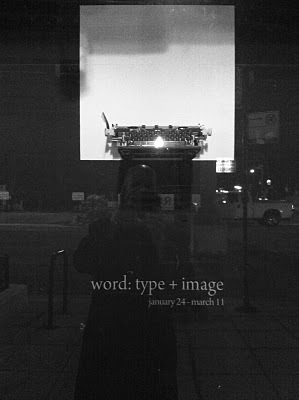
The universe has no intention, but sometimes it seems to have one.
Just after having met a woman who teaches English Columbia College Chicago, an art school, I walk past what I presume is an exhibit of student work treated text as image. But also as word.
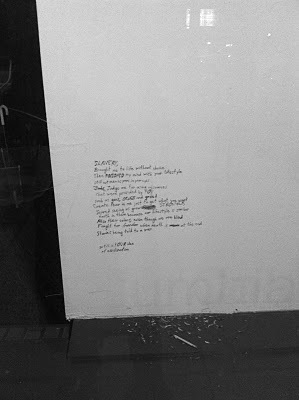
I wouldn't have used the word "type" in the title of this exhibit, given this tiny but effect little corner-bound text.
The sight of text is sign, and as sign it can move (or fail to).
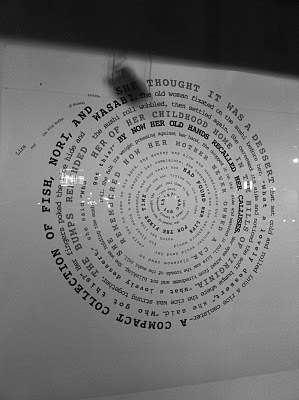
Almost returned to the 1970s with this piece, which resembles Kriwet's rundscheibe, but this is a spiral. Nicely designed, though easier to do now than in the 1970s, though ease doesn't lessen the value of the work.
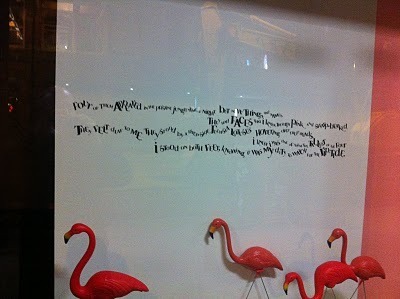
Before I left, and around the corner, I found these now-drunken flamingos under this twice-drunken text.
Then walked through the cold.
ecr. l'inf.

The universe has no intention, but sometimes it seems to have one.
Just after having met a woman who teaches English Columbia College Chicago, an art school, I walk past what I presume is an exhibit of student work treated text as image. But also as word.

I wouldn't have used the word "type" in the title of this exhibit, given this tiny but effect little corner-bound text.
The sight of text is sign, and as sign it can move (or fail to).

Almost returned to the 1970s with this piece, which resembles Kriwet's rundscheibe, but this is a spiral. Nicely designed, though easier to do now than in the 1970s, though ease doesn't lessen the value of the work.

Before I left, and around the corner, I found these now-drunken flamingos under this twice-drunken text.
Then walked through the cold.
ecr. l'inf.
Published on February 24, 2011 20:59
February 23, 2011
February 19, 2011
Onceptual Poetry
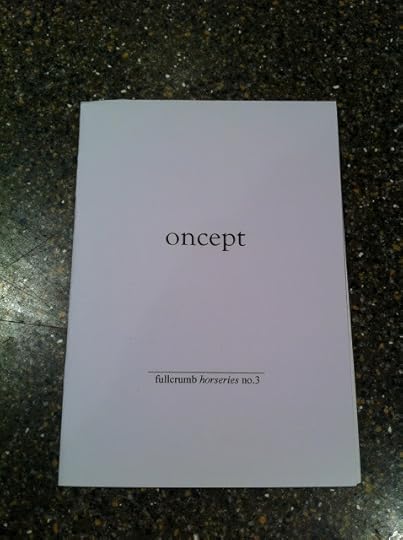 Jonathan Jones, oncept (fullcrumb horseries no. 3) (2011)
Jonathan Jones, oncept (fullcrumb horseries no. 3) (2011)Jonathan Jones, whose mind works mysteriously from the cultural redoubt of Brussels, has created another small booklet of pwoermds under the banner of his sticky pages press, and this one is filled with palindromedary works.
Well, almost. It ends with one.
But the booklet consists of paired sets of pwoermds (and one triplet just to throw us off course), and the words he has created continue to amaze and to work the mind. The art of the pwoermd is merely the process of making a word that can be memorable and significant on its own, and Jonathan does this well, well enough for his skill to frighten the weak of heart.
Like me.
Take the first pair of the book as an example:
seethingsThe first word suggests a number of seething things but also refers to a human's ability to see, particularly to see things, and maybe even to see things that are not present. The second word, since it's paired with the first, forces us to assume that the things seethings are the embers of a fire. We imagine the visible throbbing of heat withing embers. But the word isn't so much about embers as about remembering, and in this case we are remembering things in the distant past, things no longer burning full and bright. We are left with the seething embers of our memories in place of the bright flames of our original experiences.
embering
That's probably the best set in the book, but the four pages of this booklet are filled with other such tricks of words, which is what poetry is. Jonathan says the most anyone can with the fewest words anyone could use. And that is the sign of a poetic talent.
I'm always left amazed.
_____
Jones, Jonathan. oncept. fullcrumb horseries no. 3. the sticky pages press: Brussels, 2011.
ecr. l'inf.
Published on February 19, 2011 20:38
February 18, 2011
I Write Against Darkness
I write against darkness or I write / against the way that seems, in black, to wait to want to push us away / or against the day that has not come but will / or seems to will / and write against the dreams I must or may / and what I have or had / and write / and I write / and lose against the fight / and write against the sense that there is right / or loss or losing or losing will / and wont and want but won't / expunge the dark that rises up / or flows or falls or follows as it will / against the fallow furrow of my might that writes / as fingers of it write / against the sense of body as the soul / or soul as soul / and tread upon the pads of feet of this body as it pulls its own self forward into night / and all that night assumes we've lost / or last / and even if in sleeplessness I'm overtaken by the resting weight of night / I write / for words / with words / for words are all I have to write / or shapes of words against the sense of meant / with words to make the sense of night / or drain the sense right out / and sing / or sing with singing voice and tongue / with throat of singing voice and tongue / and make / against the boundaries of night / against the burden and the berth / against the ponderousness of night / and write to keep the world from breaking in the sense that it is as it always must never be / so I write / a word or words and writing as if right / and in a righted ship of words of state / as sleepless sleepy slouchy slovenly and slight / and almost always 'gainst the night / for I've no words in sunshine that I might / expend the energy to make for I am writing against the tuning orchestras of sleep / and keep / to making time with ways to write at night / to make the words appear as if on time / and stretched to make it seem that I just might / be one to make the worth of it auspicious or suspicious / and I just might / take the time to make the time to state / that I am one who writes against the night / but not because the night might cause me fright / or bury me in busyness of black but / just that night is something that takes from me my life / my waking woken fingers all untight / and tapping on the keys as if / and dancing on the keys as if / they could reverse the dominance of night that takes from us the waking working life / that wants us not to make against our time / in limitless limit as we know / to make the things we want out of our time / for we'd be sleeping them away / in dreaming that's forgotten once it is we wake / within our beds for warmth we sleep away / for I write and / writing / writhe against dominion that the night extends / and writhe against the thought that night will take me back to sleep and death / to that grave darkness that was our plight / before our birth could give us sight / and sometimes I think that I just might / win my furious pummelous fight / against the viral fields of night.
Published on February 18, 2011 21:31
February 16, 2011
A Poetics (69- 75)
69. Ouroboros
The poem does not exist in space or on the page but in the mind, first as created by the poet and second as perceived by the reader, but the poet and the reader are always one. The reader cannot exist without the poet, because the poet creates that text that makes reading possible. And the poet cannot exist without the reader because unless the poem is read by someone it does not exist at all. The poet and the reader are forever trapped in a circle and eating each other, yet never quite able to devour each other out of existence.
70. Rule
The first rule of poetry—and this is a rule for poets, one to help poets understand the world of reading—is
Nobody ever sees what it is you've put inside the poem.
71. Message
To destroy a poem, all a poet need do is focus on the message of the poem and ensure its successful transmission. A poem is an experience of language. What it is about besides language is of secondary importance. If the verbal experience fails, the poem has failed, despite any deep thinking or high ideas left within the poem.
72. Finding
For the poet, the poem must be a discovery, not a destination.
73. Doing
A poem isn't about anything. It is a process of being. In itself, it is what it is. It becomes about something only by the secondary process of understanding it. The primary contact with a poem is experiencing it.
74. Context
A word exists in context, actually in contexts which are syntactic, but also social, historical, and spatial. A word exists and functions in the context of a sentence, which is in the context of a strophe or stanza, which is in the context of a poem, which is in the context of a book, which is in the context of an oeuvre, which is in the context of a tradition, which is in the context of a culture, writ broad and large. A word may me something (or some things) in a sentence, but something different with a particular friend, and something different within the history of a family, and something different merely because of how closely it rests beside another word on a page. Words are complex and ever-changing, and that is their allure; they are the rainbow's colors melted into the iridescent water on the side of a road.
75. Sometimes
I repeat myself to clarify to myself what I mean. In that way, I am a poem, or poetic, though not quite poetry.
ecr. l'inf.
The poem does not exist in space or on the page but in the mind, first as created by the poet and second as perceived by the reader, but the poet and the reader are always one. The reader cannot exist without the poet, because the poet creates that text that makes reading possible. And the poet cannot exist without the reader because unless the poem is read by someone it does not exist at all. The poet and the reader are forever trapped in a circle and eating each other, yet never quite able to devour each other out of existence.
70. Rule
The first rule of poetry—and this is a rule for poets, one to help poets understand the world of reading—is
Nobody ever sees what it is you've put inside the poem.
71. Message
To destroy a poem, all a poet need do is focus on the message of the poem and ensure its successful transmission. A poem is an experience of language. What it is about besides language is of secondary importance. If the verbal experience fails, the poem has failed, despite any deep thinking or high ideas left within the poem.
72. Finding
For the poet, the poem must be a discovery, not a destination.
73. Doing
A poem isn't about anything. It is a process of being. In itself, it is what it is. It becomes about something only by the secondary process of understanding it. The primary contact with a poem is experiencing it.
74. Context
A word exists in context, actually in contexts which are syntactic, but also social, historical, and spatial. A word exists and functions in the context of a sentence, which is in the context of a strophe or stanza, which is in the context of a poem, which is in the context of a book, which is in the context of an oeuvre, which is in the context of a tradition, which is in the context of a culture, writ broad and large. A word may me something (or some things) in a sentence, but something different with a particular friend, and something different within the history of a family, and something different merely because of how closely it rests beside another word on a page. Words are complex and ever-changing, and that is their allure; they are the rainbow's colors melted into the iridescent water on the side of a road.
75. Sometimes
I repeat myself to clarify to myself what I mean. In that way, I am a poem, or poetic, though not quite poetry.
ecr. l'inf.
Published on February 16, 2011 19:30
February 15, 2011
There is Victory in Waiting
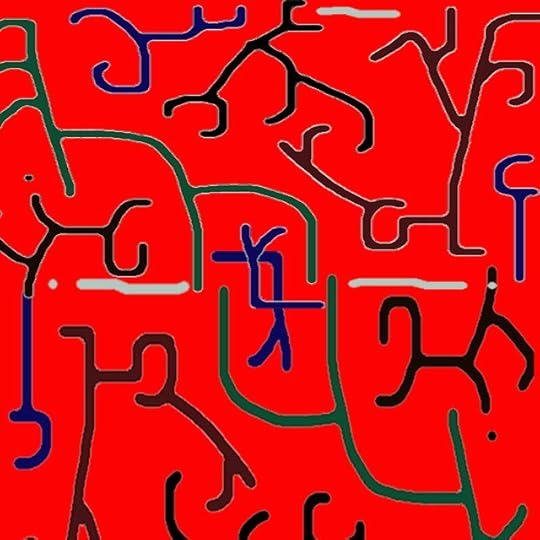 Gary Bary, "asemic mouth 2" from the poem "The Desk" (2011)
Gary Bary, "asemic mouth 2" from the poem "The Desk" (2011)Every day, as I write another poem, I think to myself that we write poems not for the sense of it, but for its unsense, for what it leaves unsaid and thus leaves us yearning for something, leaning into the poem, to see it more clearly, to hear it more fearlessly, to make some right sense out of it, though that point never comes, and we are left with a stream of words we almost understand but cannot hold still long enough to completely define.
A poem is of words in flight, and sometimes the flight is away.
Every night, I write a poem to someone I know, and I do this for 99 more nights of my life in a row, so that I will have a year's worth of poems written out, in the guise of letters, to people who usually don't expect them. Most of these poems go to people who are not poets and, more importantly, to people who do not ever read poetry. So they know not what to do with the words, which is one reason about half of them don't respond to the poem in any way, which is perfectly fine with me. They are, I assume, confused by a letter from someone who doesn't write to them, they are confused by the poem, and they question my motives. But my motives are only to write as if I'm writing to someone by actually writing to someone, so each of these poems is constructed with the idea that it will go to a particular person.
And one of the facts that makes these poems confusing is that they are poems. They are articles of writing that do not bother with the niceties of argument, that play games by hiding themselves, and that are opaque, at times, concerning their connection to the recipient. So it was with the poem I sent to Gary Barwin, which engendered this response from him:
I so appreciate both your actual letter and your poem letter. The poem has an indirect puzzling loveliness to it.Gary was puzzled as if a non-reader of poetry, because poetry is puzzling, even Gary's is, and his poetry always has a clarity, sometimes even a catchy narrative clarity, to it. But when I discovered Gary had written me a poem entitled "The Desk" that was created partly out of asemic writing and partly out of English words, I wondered what the connection was to me.
Certainly, the asemic writing resembled my work in this field of "poetic" endeavor, but what about the rest? Was the poem focused on a desk because he imagines me writing at a desk? (even though I usually write on a couch, and sometimes at a table). I don't know, but I appreciate and like the poem and the gift.
For every poem is a gift.
ecr. l'inf.
Published on February 15, 2011 19:27
February 13, 2011
Minimalism and Punning in the Peeping and the Showing
close your eyes and open them again (again)
It is possible that, in my curation of the International Visual Poetry issue of the online journal Peep/Show, I overstepped the bounds of definition to bring in Cia Rinne. Most of what we present of her work is only slightly visual in intent, but I like the work, and her work in general.
I'm not positive how to define Cia's work, but it works from the point of view of punning, which means it is of the highest form of literature. And she works macaronically, mixing English, French, Spanish, and German, and probably a few other languages I'm missing, since I don't really know them. As a matter of fact, I'm not even secure on how to define Cia, who was born in Sweden and lived a good while in Finland, so maybe I could call her a Swedish Finn, or maybe she's simply Swedish, or maybe her nationality is something else, since she's lived in a couple of other countries since I've known her, and now she lives in Germany. Cia is a contemporary writer, an international writer, who uses the language that best suits her need at any particular moment of writing.
And her works, even in this selection of minimalist poems, are set up visually to enhance the puns, to make the poems work. Maybe these are only on the margins of visual poetry, but these are a delight, one for you to take advantage of by visiting the page of her work now.
ecr. l'inf.
It is possible that, in my curation of the International Visual Poetry issue of the online journal Peep/Show, I overstepped the bounds of definition to bring in Cia Rinne. Most of what we present of her work is only slightly visual in intent, but I like the work, and her work in general.
I'm not positive how to define Cia's work, but it works from the point of view of punning, which means it is of the highest form of literature. And she works macaronically, mixing English, French, Spanish, and German, and probably a few other languages I'm missing, since I don't really know them. As a matter of fact, I'm not even secure on how to define Cia, who was born in Sweden and lived a good while in Finland, so maybe I could call her a Swedish Finn, or maybe she's simply Swedish, or maybe her nationality is something else, since she's lived in a couple of other countries since I've known her, and now she lives in Germany. Cia is a contemporary writer, an international writer, who uses the language that best suits her need at any particular moment of writing.
And her works, even in this selection of minimalist poems, are set up visually to enhance the puns, to make the poems work. Maybe these are only on the margins of visual poetry, but these are a delight, one for you to take advantage of by visiting the page of her work now.
ecr. l'inf.
Published on February 13, 2011 14:42
February 12, 2011
Films Watched in January 2011
As with book reading, my film reading this month is behind. I'm doing only a little better than one film every two days, but I haven't started watching sets of short avant-garde films yet, and that's what allows me the ability to watch a film a day.
January 1, 2011
1. Black Swan (108 min, Darren Aronofsky, 2010)
January 2, 2011
2. Inception (148 min, Christopher Nolan, 2010)
January 5, 2011
3. Donnie Darko (113 min, Richard Kelly, 2001)
January 5, 2011
4. Boogie Woogie (94 min, Duncan Ward, 2009)
January 7, 2011
5. Shutter Island (138 min, Martin Scorsese, 2010)
January 8, 2011
6. The Mission (125 min, Roland Joffé, 1986)
January 10, 2011
7. Carriers (84 min, Àlex and David Pastor, 2009)
January 12, 2011
8. Up in the Air (109 min, Jason Reitman, 2009)
January 13, 2011
9. The King's Speech (118 min, Tom Hooper, 2010)
January 15, 2011
10. Syriana (128 min, Stephen Gaghan, 2005)
January 17, 2011
11. Howl (84 min, Rob Epstein and Jeffrey Friedman, 2010)
January 20, 2011
12. Get Him to the Greek (109 min, Nicholas Stoller, 2010)
January 24, 2011
13. Bell, Book and Candle (103 min, Richard Quine, 1958)
January 27, 2011
13. Winter's Bone (100 min, Debra Granik, 2010)
January 28, 2011
14. Tetro (127 min, Francis Ford Coppola, 2009)
January 29, 2011
15. Sherman's March : A Mediation to the Possibility of Romantic Love in the South During an Era of Nuclear Weapons Proliferation (157 min, Ross McElwee, 1986)
January 30, 2011
16. Despicable Me (95 min, Pierre Coffin and Chris Renaud, 2010)
ecr. l'inf.
January 1, 2011
1. Black Swan (108 min, Darren Aronofsky, 2010)
January 2, 2011
2. Inception (148 min, Christopher Nolan, 2010)
January 5, 2011
3. Donnie Darko (113 min, Richard Kelly, 2001)
January 5, 2011
4. Boogie Woogie (94 min, Duncan Ward, 2009)
January 7, 2011
5. Shutter Island (138 min, Martin Scorsese, 2010)
January 8, 2011
6. The Mission (125 min, Roland Joffé, 1986)
January 10, 2011
7. Carriers (84 min, Àlex and David Pastor, 2009)
January 12, 2011
8. Up in the Air (109 min, Jason Reitman, 2009)
January 13, 2011
9. The King's Speech (118 min, Tom Hooper, 2010)
January 15, 2011
10. Syriana (128 min, Stephen Gaghan, 2005)
January 17, 2011
11. Howl (84 min, Rob Epstein and Jeffrey Friedman, 2010)
January 20, 2011
12. Get Him to the Greek (109 min, Nicholas Stoller, 2010)
January 24, 2011
13. Bell, Book and Candle (103 min, Richard Quine, 1958)
January 27, 2011
13. Winter's Bone (100 min, Debra Granik, 2010)
January 28, 2011
14. Tetro (127 min, Francis Ford Coppola, 2009)
January 29, 2011
15. Sherman's March : A Mediation to the Possibility of Romantic Love in the South During an Era of Nuclear Weapons Proliferation (157 min, Ross McElwee, 1986)
January 30, 2011
16. Despicable Me (95 min, Pierre Coffin and Chris Renaud, 2010)
ecr. l'inf.
Published on February 12, 2011 12:11
February 10, 2011
Still-a-Life (2008)
Hedya Klein, "Still-a-Life" (2008)
I watch many movies. My life is guided by word and image, so the rule is to read a book a day and a movie a day on average. So it is a little strange that the film that's really captured my imagination right now is Hedya Klein's one-minute-and-twenty-second film, "Still-a-Life." With music by Flatus, weird vocal squeaks and burps by Bettina Wensel, and trumpet by Klein's husband, Heimo Wallner, this film is more delightful than it sounds.
Handdrawn by Klein on paper and photographed and Final Cut into a movie, the film is about life, about living things and how they move and transform over time, and the film is filled with plants, some resembling resembling creatures, and all of them making sound. For life is sight and sound.
Give me a few words in here (but Wensel's voice is really enough) and I'd be a plump and happy lad.
ecr. l'inf.
Published on February 10, 2011 19:54



